

Den Headz, TMD shares a classic RANDY RHOADS interview that was conducted by John Stix on August 14th, 1981. The guitar legend covers a lot of ground in this fascinating, in-depth discussion. Despite losing his life in a plane joy ride gone wrong on March 19th, 1982, the talented guitar wizard has continued to inspire countless young musicians all over the world.

STIX: Rarely do I hear someone on first listen that knocks me out.
RANDY: Thank you, that’s great. I’ve been playing about 18 years and I started to get a style when I started teaching. People wanted to learn everybody’s licks, and at first it was okay. Then I thought, ‘Wait a minute, you’ve got to get your own style.’ So I started combining what they wanted to learn and just a bit of technique. You hear so many different people every day, you find yourself in it, if you can understand that. You’re teaching everybody’s licks all day. I never did that, because I never had a stereo. I never copped licks off records. I started when I was really young, when I was 7. I never got to cop records because I didn’t even have a record player. So by the time I got to teaching, I didn’t want people to get to carry on doing that too long.

STIX: Where did you get your licks from?
RANDY: From playing.
STIX: Before teaching, You must know what you are about to teach.
RANDY: I’ll tell you something, I learned more than ever by teaching. They come up with progressions and ask what kind of lead could I hear. I’d have to keep reverting to the scale. Sometimes they’d come up with questions I couldn’t answer, so I’d learn licks. Every day, from every student, I’d learn something. I’d learn so much, it was great.
STIX: You must have had your Scales down, and known chords.
RANDY: The thing is, I knew a bit because I’d been playing a long time. I started out just showing kids rock, and some group stuff, until I finally realized, ‘Wait a minute, they’ve got to be learning something.’ I started to get a lot of students, and I thought, ‘I’m gonna have to get them to learn.’
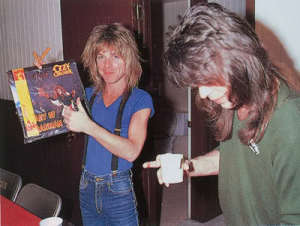
STIX: One way I learn is that in order to share something, I have to have it clear in my own head.
RANDY: That’s right. You notice when you cite it to the student, it clicks in your head. Then you answer another problem you’ve been trying to figure out.
STIX: How and why did you start playing guitar?
RANDY: I always loved it. I started with an old beat-up Gibson acoustic.
STIX: What was the dream? Who did you want to be?
RANDY: Nobody. To this day, I don’t have a guitar idol. I have people that are my favorites.
STIX: You picked up the guitar without saying, I wish I could join the Who’?

RANDY: When I started liking rock, the only idol I had was Elvis Presley. I thought he was the greatest. I didn’t realize what lead was all about at that age. I was too young to say, ‘Oh, he plays great I started at 7 and I’m now 24. Another thing, I tried lessons on and off, but I couldn’t stick with it. I didn’t have the patience. When I went back in my teens, I took classical. It did wonders for me.
STIX: Sounds like you didn’t have rock ‘n’ roll dreams at all.
RANDY: No. I’ll tell ya, when I was 12 and 13, 1 started jamming, and then I said that’s it. I want to do this for real. When I first got up and played in front of people, it was a fluke. These guys in Burbank used to jam on a mountain. I thought, ‘I want to get up and play.’ When I first did, people started clapping. I was blown away.
STIX: Jamming on blues scales?
RANDY: Yeah. I started out, and I took some lessons. A friend showed me the beginning blues scales, and that sort of showed you how you connect the barre chords to a little scale. From then on, it just adds on.
STIX: But you never listened to that stuff?
RANDY: No. To be honest, that’s a frustrating way to learn anyway. What are you gonna do with it if you learn a lick? How are you gonna use it in your songs?

STIX: You didn’t go through an imitation/innovation stage? Most people start with imitation.
RANDY: To be honest, I wish I could agree with you. Even now, everything happens so fast in this band that I haven’t had enough time to really think what I want to do. For instance, I do a solo live, and I do a lot of these things that Eddie Van Halen does, and it kills me that I do that. It’s just flash, and it impresses the kids, and I’m trying to make a name as fast as I can. I wish I could take time and come up with something that nobody has done. But unfortunately, it will take me a few years.
STIX: Can you do something you’re proud of?
RANDY: I can’t. We tried to. Now what they want to do in the show is a five minute piece where Tommy (Aldridge) gets to do a bit of a solo and then I do. Five minutes between the two of us is not very much time. Also, the kids that we play for aren’t interested in musical expertise. If I sat down and played some classical, besides those that were interested in the musical side of it, with most of the kids, it wouldn’t impress them. They’re headbangers. Ozzy has an incredible following with his audience, and most of his kids want non-stop. I experimented with a few things and tried to get some classical things in, but I really couldn’t get it in with thing is, I tried lessons off and on, but I really couldn’t get it in with this set. It’s not time. It calls for flash. It’s very heavy and everything is very powerful. The solo features are only to show off Tommy and I. At the same time they’re not supposed to represent anything like, ‘This is what I can do.’ It’s just a quick flashpot going off.
STIX: Were you in bands at 13?
RANDY: Not to speak of. My first real band called Quiet Riot. I was 16 or 17 when we started. Before that it was just friends.
STIX: Are you without influences?
RANDY: No, but I have a lot of influences from everywhere. It’s hard to pinpoint. I like a lot of classical. I like a lot of blues rock.

STIX: Why classical?
RANDY: I just like it. I think it Is a real technical thing.
STIX: Are you an accomplished player?
RANDY: No, I wouldn’t say that at all. Again, I never had the patience to go through it. I wish I could be good.
STIX: Your left hand sounds so fluid. Are you a big practicer?
RANDY: I used to play constantly. In fact, I couldn’t put it down. Now that I’m out there, I practice less than I did because I don’t have the time. I can’t sit down in a hotel room and practice.
STIX: Did you work hard on the hammer for the left hand?
RANDY: No, it just came because I always jammed with friends, always taught. I always played in my bedroom. It also came from teaching. I taught 8 hours a day, 6 days a week. Every half hour a different student.
STIX: How old?
RANDY: Every age. I had little kids, teenagers, even older people. When you sit there and play all day long, you’re gonna develop a lot of speed.
STIX: Are you still a good reader?
RANDY: I can read, but I have to look at it, think about it, and then play it. About the third time, I can read it.
STIX: How do you relate the heavy metal flash to the classical?
RANDY: I think it’s great. It’s been going like that for a long time, like Deep Purple. I think that’s very classically-influenced. It’s heavy, but it’s a way to bring melody in it, too.
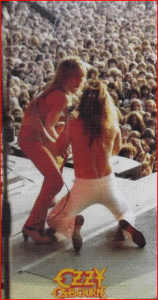
STIX: Is it incongruous to play hard and heavy, and then classical?
RANDY: There’s an answer to that. Most heavy metal is in sort of a minor tone. It’s not very melodic in nature. So you can use a lot of minor in your leads, which automatically is very classical. The more you stem out from that, the more you find a lot of notes or chords, like diminished. You look for sounds that will match that, and most likely it will sound sort of classical.
STIX: Historically, rock musicians dislike classical and vice versa, but so many of the classic hard rockers, like Beck, Page and Leslie West, all played beautiful acoustic pieces.
RANDY: There’s just so much feeling you can put into it. Leslie West was one of my all time favorite guitar players. I loved his feel. He used a lot of classical. I can feel he’s really into it when he does those little classical lines. It’s melodic but mean. Beck is also one of my favorites. They’re not idols, but I really like their playing. Beck and Michael Schenker-he’s very classical.
STIX: You were teaching up until this band with Ozzy?
RANDY: Yeah. We were in a band called Quiet Riot. Rudy was in it as well. He was the bass payer. We used to gig pretty often in L.A. It was all originals. We had two albums in Japan, on CBS/Sony. After teaching, I would also rehearse and do gigs with this band. I was busy playing a lot. I got this offer, and since then, I went.
STIX: How did this offer, as you call it, come up?
RANDY: Strange enough, one of the bass players (Dana Strum) in a local L.A. band auditioned for Ozzy on bass. They were looking for a guitar player. He was using this guy from L.A . for a while. Apparently Ozzy went through every player in L.A. I never even knew about it. I never looked for auditions or gigs. I was stuck in a rut.
STIX: Did you think Quiet Riot would be the band, or were you just excited to have an album out in Japan?
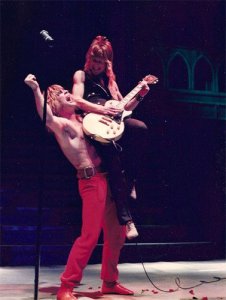

RANDY: It was more something to do. I guess I thought Quiet Riot would make it, but now that I’m away, I knew it wouldn’t. I hate to say that. It was kind of like I was growing up at the time and didn’t know it. There’s a lot more room for guitar in this band than in Quiet Riot. So Ozzy auditioned a lot of guitar players, and this guy called me and said Ozzy’s heard everybody and he liked my playing. He said, “You should go down and audition.” At first, I said, “I don’t know, I couldn’t do that.” I thought I would hurt my band.
STIX: Did you like Black Sabbath?
RANDY: I wasn’t a big Sabbath fan, to be honest. They were great at what they did, Obviously they did it well, and made it huge. I respect that. Let’s not go into it, but I wasn’t a big fan. So anyway, I was kind of wary about auditioning because I’d never been to an audition. When I did come down, he said all these guys had Marshall stacks and Echoplexes. I brought a tiny practice amp. I started tuning up and he said, “You’ve got the gig. I didn’t even get a chance to play, and I was in a recording studio with no musicians to jam with.
STIX: You didn’t even play?
RANDY: No, I just tuned, up and did some riffs, and he said, “You’ve got the gig. I had the weirdest feeling, because I thought, “You didn’t even hear me yet.”
STIX: Why do you think he gave you the gjg?
RANDY: I don’t know. Possibly he knew a certain sound he was looking for, and all these other players tried to show off too much. I didn’t get a chance to show off. I just started making a few harmonics, and maybe perhaps it was my personality, because I was really quiet and everybody was too outgoing. I still don’t know.
STIX: You got the gig and how soon afterward did you do the album?
RANDY: Within a few months I went over to England.
STIX: Are you happy with what you have on Blizzard?
RANDY: I really am. It wasn’t planned out. It was very day-to-day. If we were into it, we would do it. If we weren’t, we wouldn’t, because none of us knew what we were looking for. We were just thrown together. Whatever came out was purely inspiration.
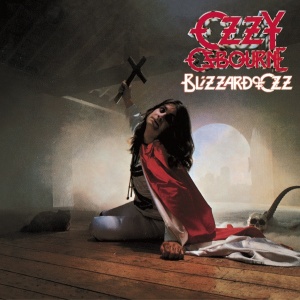
STIX: There’s a lot of great playing on there. One part leads to another.
RANDY: It’s just a combination of ideas that happened to jell.
STIX: Any favorites on the album?
RANDY: “Revelation” is my favorite, and “Mr. Crowley.” Both of those have much classical in them. They’re my favorites because of that.
STIX: Do you have an approach to solos?
RANDY: Yeah. I think about the keys, the scale for the key. I map it out in theory an d then think what feel I want to use, and what key I have to do it in.
STIX: How much of the music is yours and, how much is Ozzy’s?
RANDY: It’s both of ours.
STIX: Does Ozzy play an instrument or write?
RANDY: No. A lot of times it’s a combination of a melody he has and a riff I have that fit. That’s the truth. He Is humming something, and I’d go, “I have a chord progression that will go with that.”
STIX: Give me an example.
RANDY: “Goodbye to Romance” for sure. “Mr. Crowley” was another one. A lot of other times I’ll be sitting practicing and he’ll go, “I like that riff, can you remember that?” Naturally I never can, so we’ll do it right there and build a song out of it.
STIX: Do you live in England?
RANDY: No. I did for two years, because I had to go over there. We’ve done two albums. I’ve been away from home for a long time. I’ve only been home like two weeks at the most.
STIX: When this started, how old were you?
RANDY: Twenty two.
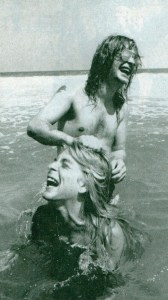
STIX: Did you work on your sound?
RANDY: In the studio? No. I didn’t have a clue what sound to use. I used to use an old beat up Peavey amp and a ripped bottom. When I got to this level, I didn’t know. I knew Altec speakers. I used to use them. I used a Distortion Plus and an equalizer. I just boost everything up real high and crank it. I think half the sound comes in the way you play.
STIX: How would you describe the way you make your sound?
RANDY: If you practice with a lot of muting, if you go out on-stage and do it loud, you’ve got sort of the same sound. I think a lot of technique is in the hands. A lot of the harmonics. It’s hard to explain.
STIX: Give me a short guitar lesson. What helps your technique?
RANDY: I used to have my students practice hammering up and down the neck, going through all the frets with the four fingers and picking each string once. Going from the first fret, all the way down the strings, then up the next fret then down the next. If you do that every day, you build up a lot of strength.
STIX: Do it with the amp on.
RANDY: Do it clean. Don’t do it with the fuzz, that’s cheating.
STIX: What about for the right hand?
RANDY: I always practiced a lot double picking. Not so much trying to be a flash picker. Take a few notes and play them normal, and then try to syncopate it by alternating the strokes. I used to do that a lot, too. The main thing is to take it as comes. Don’t try to do too much too soon. Just get to know your own style. It’s important.

STIX: You still have to push yourself.
RANDY: Oh sure, you can’t be lazy. You have to want to play. You have to love the guitar, I did. As a matter of fact, I was afraid of competition, because I thought everybody was better than me. It was so close to me, I would think anybody’s great. Therefore I couldn’t cop any licks. Because I would be copying from everybody. I just learned it on my own.
STIX: Are you better now than you were a year ago?
RANDY: I’ve gained a lot in experience, which comes out in my playing. A year ago I was probably more in practice from all the teaching and gigs and stuff. I had more time to practice. But my styles have changed now. I’ve learned more about playing live.
STIX: Let’s talk guitars.
RANDY: I’ve got a ’64 cream Les Paul and a ’57 black Les Paul, with three pickups. The Flying V was made by Carl Sandoval. He used to work at Charvel and he went off on his own. He made it for me. It has a DiMarzio Distortion Plus on the treble position and a DiMarzio PAF in the bass pickup. The only one of the three I wasn’t playing was the Charvel. That one he made for me after I joined Ozzy. The Charvel has the Seymour Duncan Distortion pickup.
STIX: What’s the switch on the Charvel?
RANDY: That’s just a toggle-switch for the pickups. The Charvel has a Charvel everything. The Flying V has all Fender parts. The Gibson, everything’s stock, but the machine heads are Schaller. I have a Les Paul in the SG shape with gold pickups and a Bigsby tremolo. Charvel just made me three new guitars. One is my own design plus Charvel’s, which hopefully might urn out to be one of my main guitars. There’s no tremolo on that one. He’s making one as an experiment with Floyd Rose. I found this guy in England who sets up tremolo arms. You don’t need Floyd Rose. I just stumbled him. It’s so close to a Floyd Rose. The tuning is real good on it. If the guitar is set up right in the first place, Doug Chandler can do wonders with it. I was so amazed about how good it stays in tune. He did it to my white Charvel. Tremolo to me is so old now that I’m trying to not get too into it. The first thing a kid does now when he wants to guitar is go get a guitar with a tremelo arm and go back and forth. Used properly, it’s great, but I don’t want to get it too much into my style. I’d rather tremolo as an addition to what I’m than make noises with it.
STIX: What do you look for in a guitar?
RANDY: Small frets. I can’t play the big Every other guitar player I know has big frets. Every time I have a guitar made or buy a guitar, I have really small frets put on, almost acoustic wire.
STIX: You like the double-coil sound?
RANDY: Yeah, but I love the Strat sound. I’m looking for an old Strat now, but live. In a trio, for what I need to hear, it’s not fat enough.
STIX: Strings and picks?
RANDY: I use regular GHS strings. In England I use Picatto. I don’t use light gauge. It’s .010 or .011 and medium picks. I like GHS strings because they have a real metallic sound, to me.
STIX: Boxes?
RANDY: MXR Distortion Plus, MXR Equilizer, Crybaby Wah, MXR Chorus, MXR Flanger, Korg Echo.

STIX: Do you practice playing with the gadgets?
RANDY: No, because I don’t use them that much. I use the distortion a lot. I used to use them more, because I had time to learn what I wanted to do with them. But I don’t need them much with this band. It’s really pretty much down the plane.
STIX: Do you use a wireless?
RANDY: I tried it once, didn’t like it and haven’t tried it again since. It was a Schaffer. I’m not against it. Because I didn’t like it, it was no big deal. I’ve never been bothered by a guitar chord. I’ve used them so long, I could never think, “I do need to get rid of this chord.”
STIX: Do you ever feel you overplay because it’s a trio?
RANDY: No, in fact, I think I could do more. I’m still learning my way on the big stage.
STIX: You don’t feel a big burden because you’re the only harmonic instrument?
RANDY: No, not at all. We do have keyboards the side, that fill little bits, but it’s only on three numbers. I like the sound of two guitars in other bands, but I couldn’t play with two guitars. It’s just too confining. I like to have the freedom.
STIX: Does it seem strange that all of a sudden people say you’re great? You’ve gone from teaching at $8 a half hour, to Quiet Riot, to the big stage with Ozzy.
RANDY: It’s totally strange. It still hasn’t hit me yet. I’ve still got my past in me. I guess I’m trying to mature into it, but I don’t have my feet on the ground at all. I don’t even know who I am, what I am. People say this will go to your head and make you egotistical. That’s a load of shit. What it does is make you total frightened and humble. Because you don’t understand it, because everything comes at you so fast.
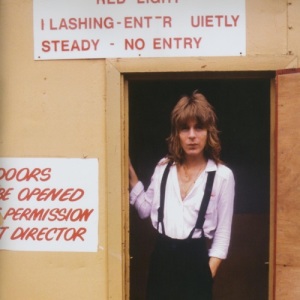
STIX: Does it seem out of proportion?
RANDY: Not yet. First of all, I’ve got a long way to go. How can I put it? Because Ozzy’s so big, and such a humble guy, I think it helps me a lot. He always says this will happen, and it does. He sort of educates me.
STIX: Like what?
RANDY: Everything. He’ll tell me about the record companies, and about the kids in the audience. He’s just predicted everything along the way.
STIX: What did he teach you about performing on-stage?
RANDY: I learned a lot from him about posing. My old band was really into trying to get the crowd, and the only way we knew how to was by going over the top. I learned from Ozzy that you don’t need to do that if you’re good. Now I move when I want to, not because I think I have to do it. I didn’t come out doing it with him, but I learned straight-away from his personality that it doesn’t take that.
STIX: What about guitar playing? Did you ever overplay? Most people overplay and learn what they need to drop. You seem to be edging in very cautiously, starting at low tide.
RANDY: I don’t want to be a ham and throw in the kitchen sink, but I still want to get my mark in.
STIX: I guess you don’t feel that you’re up there with the people that you admire?
RANDY: Oh no. You’re only as good as you are.
STIX: What’s your strength and what’s your weakness?
RANDY: Great question. I’ve never been asked that. My weakness is insecurity. I don’t go up there every night with a lot of confidence. That’s a weakness. If the sound is not right, I’ll get paranoid. My weakness is my sound. I rely on it 100%. I don’t know how to put it, but I’m still learning about what to feel on-stage, which is probably totally different than a small level. If the sound isn’t right, it could totally blow you away. My strength is that I just want to keep getting better. I want people to know me as a guitar player, like. I knew other people. My strength is my determination. I don’t want to be satisfied with myself. Once you are, where are you going to go? You’re gonna stay the same level. I want people to know me as a guitar player the way I knew other people. quite I’ve got to be honest: you asked, “What’s your weakness?” My girlfriend distracts me. That’s the real truth. I don’t know if you should put that. Maybe you should say I get distracted easily. But if can totally blow it for me.
STIX: If the relationship is not going well, or if she says, “Come on over”?
RANDY: Both. That’s one thing that can take me away from my instrument, which never happened in my past.
STIX: That’s a good thing, because people are better than instruments in the end.
RANDY: Good, that’s great, because I’ll put it down for that, and I never put it down in my life for anybody. She is also my strength at the same time. I’m sorry. Let’s go on.

STIX: Do you have a plan to get better?
RANDY: To be honest, I want to start getting back to practicing. Obviously, now, it’s just go, go. There’s no breaks. When I do have a break, I want to go back to teaching and learning myself, taking lessons. In England, I had a lot of time, and I took classical again. If I have a month off, I’ll go back and take classical lessons. I want to keep bettering myself.
STIX: Fantasize five years ahead.
RANDY: Five years ahead? I would love to have people know me as a guitar hero. I’d like to be able to do something more instrumental. Someday maybe put out a solo album where I can dig into a lot of instrumentals. I like a lot of different kinds of music.
STIX: Let me shoot you some names for a reaction: John McLaughlin?
RANDY: Technically brilliant, but it’s not one of my favorite styles.
STIX: Allan Holdsworth?
RANDY: He’s great. I love his playing. He’s got a lot of great jazz scales. He’s got scales where you don’t know what they are.
STIX: Andy Summers of the Police?
RANDY: Definitely unique, It’s hard for me because I really don’t listen.
STIX: Pat Metheny?
RANDY: I like him. He does some great acoustic stuff.
STIX: Who was important to you?
RANDY: Leslie West. Great feel, really moody and powerful. He was one of my favorites. Beck, because he can do anything. He can play one note and it’s great. I rarely hear him play fast. Blackmore was great I loved his expression. I loved B.B. King. I like Michael Schenker’s playing a lot. I liked Ronnie Montrose with Edgar Winter a lot. I liked the way he bends. I could never bend like he could. His vibrato. I liked Earl Klugh a lot. I like Steve Lukather’s playing. I liked all the English players in the ’70s. They had a lot of vibrato. That sound influenced me a lot. Kids always say, ‘You know when so-and-so does this?’ I say, ‘Yeah, it’s great,’ but I don’t know. I don’t have any rock player’s albums.
STIX: What do you listen to?
RANDY: To be honest, I listen to a lot of background music. Music I don’t have to think about. I don’t listen to music to achieve anything from it. I just listen to relax or be social. It’s mellow jazz and a lot of classical. If I’m out in public, I like to hear blaring loud rock, but never in my house.
STIX: When would you listen to Ozzy Osbourne?
RANDY: I like it when I walk in somewhere and it’s on. I never listen to it at home. I couldn’t listen to myself, anyway. I don’t like to.
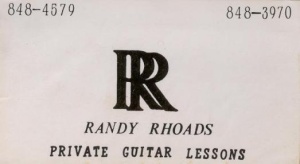
STIX: You came from a musical family?
RANDY: Both of my parents are music teachers. My mother owns the school that I taught in. My brothers and sisters are musicians. My mom pushed me all the time. She knew that I could do it. She knew more than I did. She thought I would go somewhere. She gave me the job and helped me get equipment, which a lot of parents don’t do. A lot of my students had to go out and fight for it.
STIX: Was college ever in the picture?
RANDY: I graduated high school, and that’s when I started playing. I wouldn’t mind. I’d like to someday. It doesn’t fit for heavy metal.
STIX: Diary was recorded how far after Blizzard?
RANDY: It was recorded eight months later. Diary is a year old now.
STIX: Do you give Diary as much stock as Blizzard?
RANDY: The first album, none of us had played together. It was everything at once. We were putting the band together, writing the songs and being in the studio at the same time. So the energy was there in the first album. The material wasn’t. The second, we were really trying to get some sort of direction. We were thinking more in terms of songs than just jam sort of things. I would say on this second album we put a lot more energy into the songwriting part of it. Where the first album was, ‘Turn it up to 10 and if it feels good, just play it.’
STIX: The guitar playing on Diary felt a bit rushed.
RANDY: It did. To be honest, that album, to me, was a bit rushed. In other words, we didn’t have as much time to write it. The material came out shining, but I was a bit lost for licks, what to do on it. I didn’t have enough time to think what I wanted to do. I didn’t have time to think of ideas. It all happened so quickly. We did the first album, went on tour, came back and did the second one. It couldn’t have been a whole year, now that I think about it. I for think it was within six months, actually.
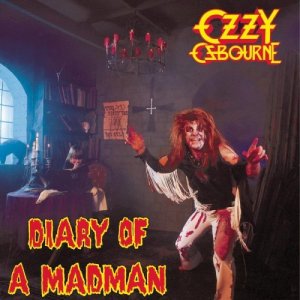
STIX: Any highlights on Diary of a Madman?
RANDY: There’s some great stuff on that album. Do you mean guitar-wise?
STIX: Yeah.
RANDY: “Over the Mountain,” and “Diary of a Madman” is real good. I, personally, also like “Flying High Again.”
STIX: Do you go home with the basic tracks and play along?
RANDY: No, we just jam a lot. We played to the first album a lot. I had time to sit back and say, “I don’t like that lead, that’s not I’m looking for.” For Diary, I sort of had to put the leads together in the studio. ‘That’s it. Be happy with it or else.’ For how I did it, I’m happy with it. Still, I didn’t have enough time to search. what I wanted to play. Possibly if we had more time to write it, it would have been different. We could have played the songs more. What happened was we got a basic form for it, and went right into the studio. What I was trying to say was I had just gotten off a tour for the first album. I hadn’t had a break yet. I didn’t have time to sit back and think, “Now, what do I want to do? What do I want to accomplish on the next record?” Therefore, I was really short for ideas that I was actually interested in.
STIX: Do you cringe a little because it’s not as original as you would like it?
RANDY: Some songs I really cringe. One song, “Little Dolls,” I never got to put a solo on. It’s actually a guide track. I was playing along with the record where I was gonna put a solo down. I never got to do it. The one that is there is a guide solo. We were so rushed for time in the studio because we had to get to America to start the tour.
STIX: Will you have a better grasp for the next one?
RANDY: I don’t want to go in so rushed. I want to be prepared for the studio.

STIX: A few years from now you’ll say the first album was a good beginning, and the third album was my next major growth
RANDY: I agree with that. On the second album I was just wrapped up in the middle of everything to the point where I couldn’t get a hold on it. I have to say that a lot of things lack feeling to me. It’s just sort of like play anything you can think of. I like what I played on “Diary” and “Over the Mountain.” I like the song called “Rock and Roll.” Other than that, it just all seems a bit ordinary to me, like anybody else.
STIX: Because you’re aware of that, can you approach your own style? Being aware of where you want to go is one thing. Are you taking steps toward that direction?
RANDY: I personally feel a lot of my style is leaning toward more melodic playing. I feel, when I was taking classical, it gave me a lot of ideas to turn things into leads. The thing I keep thinking is if I could only study again, I could have all this new input for ideas. I could stumble upon things again. What’s happening now is I feel like I need some totally new scales or something. Sources. I find I play the same thing and I sort of get bored with it.
STIX: New source material from classical.
RANDY: I knew when I was studying that I got a lot from there. I think it would help. I’m on the road all the time, so I don’t really know. I was thinking of trying to teach myself again, but you know how that is. You do everything wrong.

STIX: Ozzy said you mentioned having a tutor on the road.
RANDY: I was wondering if it’s been done. I was thinking the only way I could keep myself together on the road, and keep practicing and keep playing, is to have a teacher sort of thing every day. Besides the fact that the cost would be ridiculous, I was wondering if someday it would be possible to do. What I’m finding now is, I go on the road, and aside from gigging, I’m not really sure what I want to do. I don’t know if I want to stay in and practice or go out. I need something to keep me there, some responsibility. I’m sort of bored with my own playing. I’ll pick up a guitar and it seems like it’s the same thing now. I need total stimulation from somewhere.
STIX: I feel if I can play it, so what?
RANDY: That’s exactly what I’m saying. I think, “Well, okay, you’ve got to sit down and play every day, and you’ll accidentally come up with things.” That’s true. If you sit with the guitar long enough every day, you’re gonna come up with stuff and you’re gonna improve. But sometimes it’s hard to put yourself in that frame of mind.
STIX: Eddie Van Halen locks himself in the closet and plays for hours.
RANDY: I do that. That’s the best way. Sometimes I’ll go down to the gig way early and sit in the tune-up room all day. But I’m finding that I’m losing my control on that right now. So what I’m saying is that, if I had a tutor, it would sort of like be a responsibility. I’m paying this guy and it’s my commitment to keep at it. This is all new to me, and now I’m in my second year and going through the biz changes, how to stay on top of yourself.
STIX: Has the spotlight made it harder for you as a player?
RANDY: No, it’s not, but what has happened, though, is I feel like it’s brought to my attention that I’ve really got to start getting a hold on it now. I’m totally shocked that it happened, and it changes your whole thing. Now I’ve got to get it together. It’s no longer just ‘Try your best.’ You’ve got to be great now. It’s a weird thing. All of a sudden you’re put under a different kind of pressure. It’s a pressure that you’ve always got to be better than yourself, which is a difficult thing to be. What do they do on the road? Eddie is great. I don’t want to get near competing with people like that.

STIX: Neither did he. Has thinking of a solo album been approached?
RANDY: Believe it or not, I haven’t met many people in the biz yet. I’m not at that level where I meet people all the time. I would love to do a solo album. All along I put it to timing. The right time for the right thing. I really haven’t been able to think. I’ve just been trying to hang onto myself, to keep up with everything.
STIX: What do you do for musical stimulation?
RANDY: I’m locked into something right now, and it’s not my own pace. Therefore, it’s kind of stifling sometimes. I was thinking one of the greatest things would be to play on other people’s records. That could build up a lot for me. I could do a different sort of playing and be known for that as well. It would also spread my name in different areas. Now it’s very limited. Ozzy Osbourne is about as heavy metal as you can get, and a lot of people don’t even know about it because of that. It’s almost like being Kiss. That’s why I’m thinking I want to study classical. It’s totally different for me. I was used to taking lessons and teaching all day long. had constant input with music. New ideas were going in and out of my brain all day. It’s a combination of stopped ideas and touring, because this band tours a lot. It’s trying to find something. It’s all in my head. I’ve got to put it together. I would like to play more of a lot of light jazz things, like Earl Klugh or Jean Luc Ponty. I was never into heavy fusion. Things I had written were on the melodic side. I used to play a lot of things like that on acoustic. It’s just what you’re doing at the time. The main thing I’m going through is how to get more back to being a musician than being a big band. That’s my biggest problem. To get back to being a player and get away from – I don’t want to say rock star, because I’m not. But I do want to get away from the distractions of success.
https://www.facebook.com/randyrhoads.society

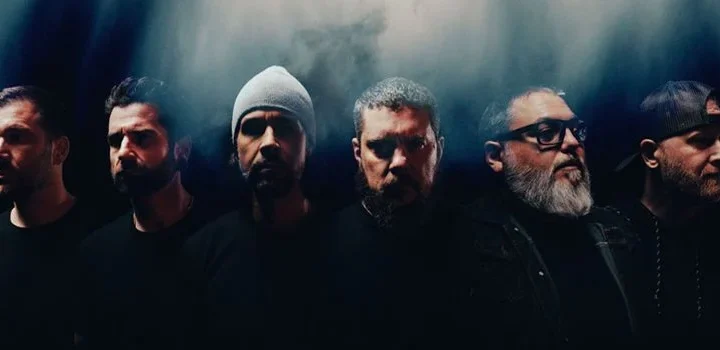

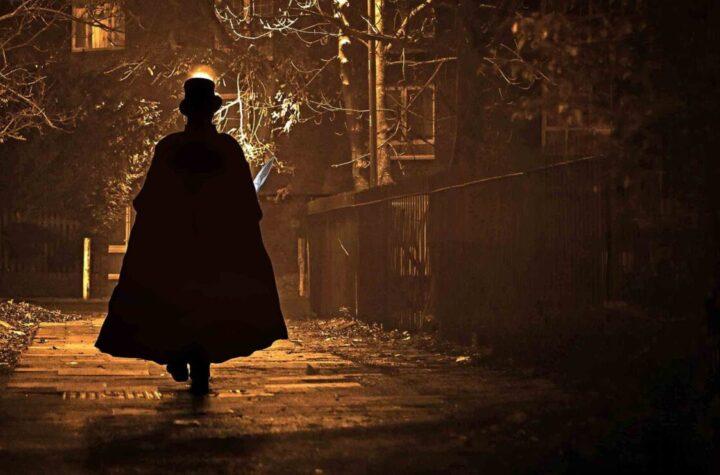

More Stories
Rocket Interviewed by Kristy Roxx of The Pit Press! (AUDIO)
ROCKET Interviews Vince Meal
ROCKET Interviewed by FM Rock Radio Station WQEE 99.1 (6/5/2024)